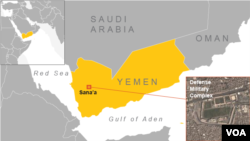CAIRO —
A suicide bomber and gunmen attacked the heavily guarded defense ministry compound in the Yemeni capital, Sana'a, killing 52 people.
Al-Qaida in the Arabian Peninsula claimed responsbility for the attack. A statement issued on Twitter Friday by the group's media arm said it attacked the Defense Ministry building complex in the capital Sana'a because it "accommodates drone control rooms and American experts."
According to an official government statement, 167 people were wounded in the attack.
Ambulances and rescue vehicles rushed to the scene of the attack at the defense ministry, as soldiers inside the compound battled attackers for several hours. Most of the casualties occurred at the ministry's hospital where doctors and nurses reportedly were killed.
Yemeni state TV showed images of dead gunmen. Witnesses said grenades and automatic weapons were used by the assailants.
One soldier said he and his colleagues heard the bomb explosion and saw militants break into the compound and attack people.
The daylight assault on the fortified defense ministry compound took place as Yemen's defense minister was visiting Washington to discuss defense cooperation. A ministry spokesman said most of the attackers were killed.
Yemeni President Abd-Rabbu Mansour Hadi was shown on state television visiting the defense ministry compound, thanking soldiers for their courage.
The attack was just the latest in a series of violent incidents inside and outside the capital. Sporadic fighting in the north of the country between Houthi rebels and hardline Islamists, known as Salafis, continues intermittently.
Stephen Steinbeiser of the American Institute for Yemeni Studies said that much of the recent violence appears aimed at disrupting the national dialogue talks aimed at reaching a political settlement to months of protracted conflict.
"This has been quite a violent couple of weeks and it seems all directed towards fostering the sectarian conflict and disrupting the political process," said Steinbeiser. "Only three days ago they announced a new security plan for the capital, which included not allowing motorcycles on the streets in the central part of the capital, so someone is trying to send a message, obviously, and I think the message is basically 'it doesn't matter what kind of security plan you have in place, it doesn't matter what kind of negotiated political transition you have, we're going to disrupt it.'"
Steinbeiser said the dialogue sessions were due to have reached a negotiated settlement by September, but he said that talks have broken down frequently and also have been hampered by a boycott by politicians from the south of the country.
Al-Qaida in the Arabian Peninsula
Al-Qaida in the Arabian Peninsula- Formed by a 2009 merger of al-Qaida's Yemen and Saudi branches
- Plotted unsuccessful underwear bomb plot on Christmas Day 2009
- Planned foiled plot to send mail bombs hidden in toner cartridges to the US in 2010
- Established sanctuaries in Yemen, overrunning entire towns and villages
- Led by Nasir al-Wahishi, former assistant to Osama bin Laden
According to an official government statement, 167 people were wounded in the attack.
Ambulances and rescue vehicles rushed to the scene of the attack at the defense ministry, as soldiers inside the compound battled attackers for several hours. Most of the casualties occurred at the ministry's hospital where doctors and nurses reportedly were killed.
Yemeni state TV showed images of dead gunmen. Witnesses said grenades and automatic weapons were used by the assailants.
One soldier said he and his colleagues heard the bomb explosion and saw militants break into the compound and attack people.
The daylight assault on the fortified defense ministry compound took place as Yemen's defense minister was visiting Washington to discuss defense cooperation. A ministry spokesman said most of the attackers were killed.
Yemeni President Abd-Rabbu Mansour Hadi was shown on state television visiting the defense ministry compound, thanking soldiers for their courage.
The attack was just the latest in a series of violent incidents inside and outside the capital. Sporadic fighting in the north of the country between Houthi rebels and hardline Islamists, known as Salafis, continues intermittently.
Stephen Steinbeiser of the American Institute for Yemeni Studies said that much of the recent violence appears aimed at disrupting the national dialogue talks aimed at reaching a political settlement to months of protracted conflict.
"This has been quite a violent couple of weeks and it seems all directed towards fostering the sectarian conflict and disrupting the political process," said Steinbeiser. "Only three days ago they announced a new security plan for the capital, which included not allowing motorcycles on the streets in the central part of the capital, so someone is trying to send a message, obviously, and I think the message is basically 'it doesn't matter what kind of security plan you have in place, it doesn't matter what kind of negotiated political transition you have, we're going to disrupt it.'"
Steinbeiser said the dialogue sessions were due to have reached a negotiated settlement by September, but he said that talks have broken down frequently and also have been hampered by a boycott by politicians from the south of the country.





